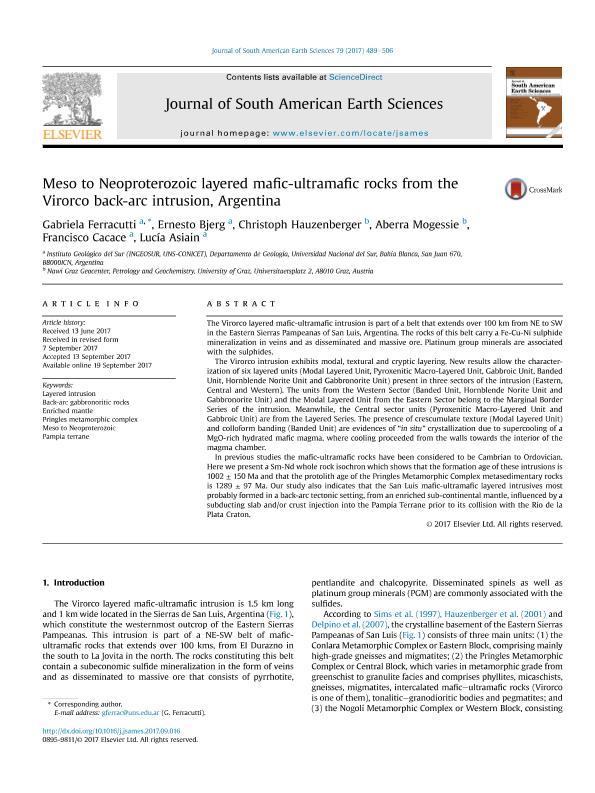Mostrar el registro sencillo del ítem
dc.contributor.author
Ferracutti, Gabriela Roxana

dc.contributor.author
Bjerg, Ernesto Alfredo

dc.contributor.author
Hauzenberger, Christoph
dc.contributor.author
Mogessie, Aberra
dc.contributor.author
Cacace, Francisco Esteban

dc.contributor.author
Asiain, Lucia Montserrat

dc.date.available
2018-09-21T23:11:05Z
dc.date.issued
2017-11
dc.identifier.citation
Ferracutti, Gabriela Roxana; Bjerg, Ernesto Alfredo; Hauzenberger, Christoph; Mogessie, Aberra; Cacace, Francisco Esteban; et al.; Meso to Neoproterozoic layered mafic-ultramafic rocks from the Virorco back-arc intrusion, Argentina; Pergamon-Elsevier Science Ltd; Journal of South American Earth Sciences; 79; 11-2017; 489-506
dc.identifier.issn
0895-9811
dc.identifier.uri
http://hdl.handle.net/11336/60692
dc.description.abstract
The Virorco layered mafic-ultramafic intrusion is part of a belt that extends over 100 km from NE to SW in the Eastern Sierras Pampeanas of San Luis, Argentina. The rocks of this belt carry a Fe-Cu-Ni sulphide mineralization in veins and as disseminated and massive ore. Platinum group minerals are associated with the sulphides. The Virorco intrusion exhibits modal, textural and cryptic layering. New results allow the characterization of six layered units (Modal Layered Unit, Pyroxenitic Macro-Layered Unit, Gabbroic Unit, Banded Unit, Hornblende Norite Unit and Gabbronorite Unit) present in three sectors of the intrusion (Eastern, Central and Western). The units from the Western Sector (Banded Unit, Hornblende Norite Unit and Gabbronorite Unit) and the Modal Layered Unit from the Eastern Sector belong to the Marginal Border Series of the intrusion. Meanwhile, the Central sector units (Pyroxenitic Macro-Layered Unit and Gabbroic Unit) are from the Layered Series. The presence of crescumulate texture (Modal Layered Unit) and colloform banding (Banded Unit) are evidences of “in situ” crystallization due to supercooling of a MgO-rich hydrated mafic magma, where cooling proceeded from the walls towards the interior of the magma chamber. In previous studies the mafic-ultramafic rocks have been considered to be Cambrian to Ordovician. Here we present a Sm-Nd whole rock isochron which shows that the formation age of these intrusions is 1002 ± 150 Ma and that the protolith age of the Pringles Metamorphic Complex metasedimentary rocks is 1289 ± 97 Ma. Our study also indicates that the San Luis mafic-ultramafic layered intrusives most probably formed in a back-arc tectonic setting, from an enriched sub-continental mantle, influenced by a subducting slab and/or crust injection into the Pampia Terrane prior to its collision with the Rio de la Plata Craton.
dc.format
application/pdf
dc.language.iso
eng
dc.publisher
Pergamon-Elsevier Science Ltd

dc.rights
info:eu-repo/semantics/openAccess
dc.rights.uri
https://creativecommons.org/licenses/by-nc-sa/2.5/ar/
dc.subject
Back-Arc Gabbronoritic Rocks
dc.subject
Enriched Mantle
dc.subject
Layered Intrusion
dc.subject
Meso to Neoproterozoic
dc.subject
Pampia Terrane
dc.subject
Pringles Metamorphic Complex
dc.subject.classification
Meteorología y Ciencias Atmosféricas

dc.subject.classification
Ciencias de la Tierra y relacionadas con el Medio Ambiente

dc.subject.classification
CIENCIAS NATURALES Y EXACTAS

dc.title
Meso to Neoproterozoic layered mafic-ultramafic rocks from the Virorco back-arc intrusion, Argentina
dc.type
info:eu-repo/semantics/article
dc.type
info:ar-repo/semantics/artículo
dc.type
info:eu-repo/semantics/publishedVersion
dc.date.updated
2018-09-10T15:57:02Z
dc.journal.volume
79
dc.journal.pagination
489-506
dc.journal.pais
Estados Unidos

dc.journal.ciudad
Nueva York
dc.description.fil
Fil: Ferracutti, Gabriela Roxana. Consejo Nacional de Investigaciones Científicas y Técnicas. Centro Científico Tecnológico Conicet - Bahía Blanca. Instituto Geológico del Sur. Universidad Nacional del Sur. Departamento de Geología. Instituto Geológico del Sur; Argentina
dc.description.fil
Fil: Bjerg, Ernesto Alfredo. Consejo Nacional de Investigaciones Científicas y Técnicas. Centro Científico Tecnológico Conicet - Bahía Blanca. Instituto Geológico del Sur. Universidad Nacional del Sur. Departamento de Geología. Instituto Geológico del Sur; Argentina
dc.description.fil
Fil: Hauzenberger, Christoph. Karl-Franzens-Universität Graz; Austria
dc.description.fil
Fil: Mogessie, Aberra. Karl-Franzens-Universität Graz; Austria
dc.description.fil
Fil: Cacace, Francisco Esteban. Consejo Nacional de Investigaciones Científicas y Técnicas. Centro Científico Tecnológico Conicet - Bahía Blanca. Instituto Geológico del Sur. Universidad Nacional del Sur. Departamento de Geología. Instituto Geológico del Sur; Argentina
dc.description.fil
Fil: Asiain, Lucia Montserrat. Consejo Nacional de Investigaciones Científicas y Técnicas. Centro Científico Tecnológico Conicet - Bahía Blanca. Instituto Geológico del Sur. Universidad Nacional del Sur. Departamento de Geología. Instituto Geológico del Sur; Argentina
dc.journal.title
Journal of South American Earth Sciences

dc.relation.alternativeid
info:eu-repo/semantics/altIdentifier/url/https://www.sciencedirect.com/science/article/pii/S0895981117302341
dc.relation.alternativeid
info:eu-repo/semantics/altIdentifier/doi/http://dx.doi.org/10.1016/j.jsames.2017.09.016
Archivos asociados
